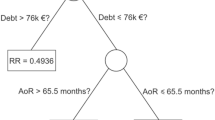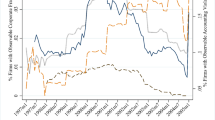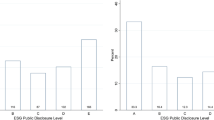Abstract
The presumption is that a broker executing a stock trade for a retail investor will get the investor the best possible price execution for the transaction. In fact, the broker often sells the retail investor’s trade to an intermediary for cash payment. The broker’s motivation to generate dealer profits seems to overcome the broker’s fiduciary responsibility to obtain the best execution price for the customer, raising ethical questions. Purchasers and internalizers of order flow in the market may cause prices quoted on the NYSE to deteriorate, making all investors worse off.
Similar content being viewed by others
References
Ackermann C., T. Loughran 2007, Mutual Fund Incubation and the Role of the Securities and Exchange Commission, Journal of Business Ethics 70, 33–37
Battalio R. 1997, Third Market Broker-Dealers: Cost Competitors or Cream Skimmers? Journal of Finance 52:341–352
Battalio R., J. Greene R. Jennings, 1998, Order Flow Distribution, Bid-Ask Spreads, and Liquidity Costs: Merrill Lynch’s Decision to Crease Routinely Routing Orders to Regional Stock Exchanges, Journal of Financial Intermediation 7, 338–358
Battalio R., R. Jennings J. Selway, 2001 The Relationship Among Market-Making Revenue, Payment for Order Flow, and Trading Costs for Market Orders Journal of Financial Services Research 19, 39–56
Boehmer, E., R. Jennings and L. Wei: 2007, ‹Public Disclosure and Private Decisions: Equity Market Execution Quality and Order Routing,’ Review of Financial Studies 20, 316–358
Chen H.-C., J. Ritter 2000 The Seven Percent Solution Journal of Finance 55, 1105–1131
Doyle, J. M.: 1993, ‹Paying for Stock Orders: Bribery or Competitive Edge?’ (The Associated Press, 16 May)
Houge T., J. Wellman 2005, Fallout from the Mutual Fund Trading Scandal Journal of Business Ethics 62, 129–139
‹How Street Turns Trades into Gold.’ Wall Street Journal 16 February, 1993
Loughran T. 2005, NASD Rule 2110 and the VA Linux IPO, Journal of Business Ethics 62, 141–146
Macey J., M. O’Hara 1997, The Law and Economics of Best Execution Journal of Financial Intermediation 6, 188–223
Acknowledgements
We would like to thank participants at the 2006 University of Notre Dame Ethical Dimensions in Business Conference, a referee, and Ann Tenbrunsel (editor) for helpful suggestions. Kim Lorenzen provided helpful research assistance.
Author information
Authors and Affiliations
Corresponding author
Additional information
University of Notre Dame Finance Professor Robert Battalio received a Bachelor of Science from Texas A&M University and a Ph.D. from the Indiana University. University of Notre Dame Finance Professor Tim Loughran received a Bachelor of Arts and a Bachelor of Science from the University of Illinois (Urbana), an MBA from Indiana University, and a Ph.D. from the University of Illinois (Urbana).
Rights and permissions
About this article
Cite this article
Battalio, R.H., Loughran, T. Does Payment For Order Flow To Your Broker Help Or Hurt You?. J Bus Ethics 80, 37–44 (2008). https://doi.org/10.1007/s10551-007-9445-x
Published:
Issue Date:
DOI: https://doi.org/10.1007/s10551-007-9445-x




